How did the Olympics change when they were revived after WWI until the Berlin Games in 1936?
Before starting off, let us remember the Olympians who perished in and were permanently affected by the Great War. This list is a pretty depressing read, especially for an Olympics fanatic like myself.
To see the changes for yourself, here’s a detailed look at the Olympic Games that followed during the interwar years:
GAMES OF THE VIIth OLYMPIAD (ANTWERP '20)
During the war, Lyon (France) made a bid for the 1920 Games, but after some discussion, they agreed to support Antwerp and postpone their bid until 1924 if Antwerp was liberated in time to organize the games. The support for Belgium by France, the leading country of the International Olympic Committee at the time, also meant that Amsterdam and Budapest made no chance for the 1920 Games against Antwerp. New candidacies from American cities did not have that disadvantage and bids were received from Cleveland, Philadelphia, and Atlanta, and Cuba also planned a bid for Havana. But shortly after the armistice in November 1918, the IOC decided to give Antwerp the first choice, if they still wanted to host the 1920 Games. In March 1919, the Belgian Olympic Committee decided to go ahead with the organization, and on April 5, 1919, in a meeting in Lausanne, Antwerp was officially declared the host city for the 1920 Games.
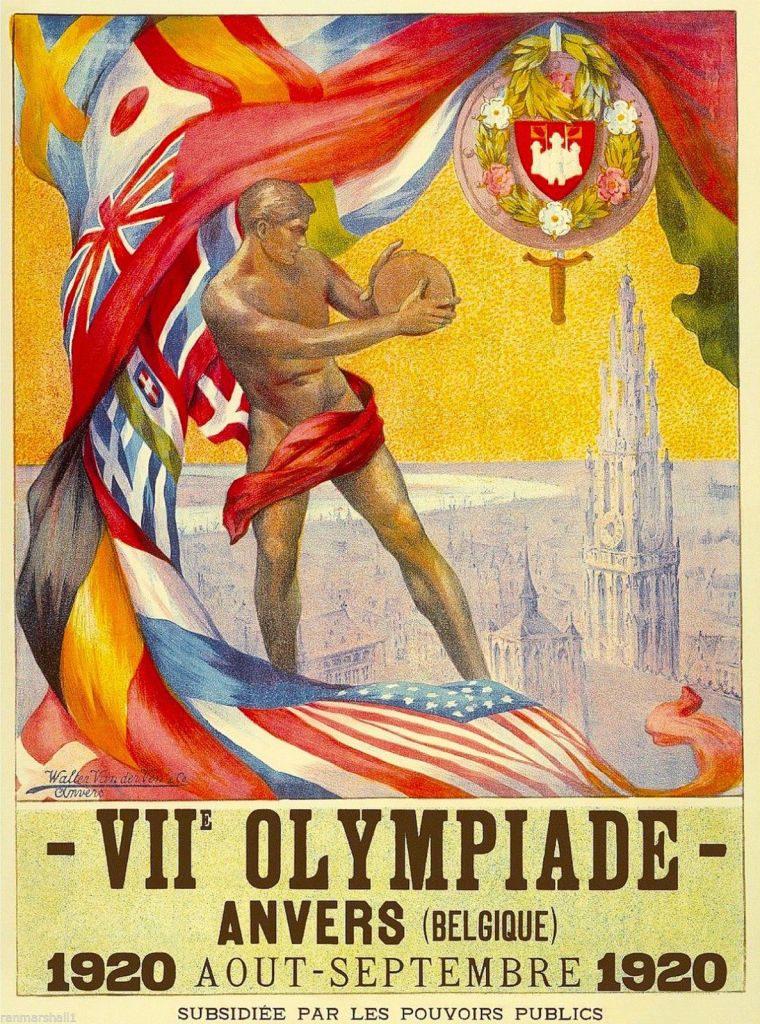
As a result of World War I and its aftermath, Germany, Hungary, Austria, Bulgaria and the Ottoman Empire were banned from competing in the Games. From the newly created European states, only Estonia and Czechoslovakia took part. Poland was busy with the Polish-Soviet War and therefore was unable to form an Olympic team. Soviet Russia was also not invited as part of its political embargo by the West (the Soviets wouldn’t compete for another 32 years). Germany did host their own games though, starting around 1922.
Argentina; the Kingdom of Serbs, Croats and Slovenes; Brazil and Monaco competed as nations at the Olympics for the first time. New Zealand, which had competed alongside Australia (Australasia) in 1908 and 1912, competed on its own for the first time.
The Antwerp Games were the first in which the Olympic Oath was voiced, the first in which doves were released to symbolize peace, and the first in which the Olympic Flag was flown (the flag was designed in 1912).
The Games also featured a week of winter sports, with figure skating appearing for the first time since 1908, and ice hockey making its Olympic debut.
Nedo Nadi won 5 gold medals in the fencing events.
At the age of 72, Sweden’s 100m running deer double-shot event champion Oscar Swahn, who had participated in the 1908 and 1912 Games, came in second in the team event to become the oldest Olympic medal winner ever.
23-year-old Paavo Nurmi won the 10,000m and 8,000m cross country races, took another gold in team cross country, and a silver in the 5000m run. His contributions for Finland broke record in track and field with 9 medals.
Duke Kahanamoku retained the 100m swimming title he won before the war.
The 12-foot dinghy event in sailing took place in two different countries. The final two races in the event were independently held in the Netherlands, on its own accord, supposedly because the only two competitors in the event were Dutch.
Sport shooter Guilherme Paraense won Brazil’s very first gold medal at the Olympic Games.
The United States won the most medals, both gold and overall.
| Rank | Nation | Gold | Silver | Bronze | Total |
|---|---|---|---|---|---|
| 1 | United States | 41 | 27 | 27 | 95 |
| 2 | Sweden | 19 | 20 | 25 | 64 |
| 3 | Great Britain | 15 | 15 | 13 | 43 |
| 4 | Finland | 15 | 10 | 9 | 34 |
| 5 | Belgium | 14 | 11 | 11 | 36 |
| 6 | Norway | 13 | 9 | 9 | 31 |
| 7 | Italy | 13 | 5 | 5 | 23 |
| 8 | France | 9 | 19 | 13 | 41 |
| 9 | Netherlands | 4 | 2 | 5 | 11 |
| 10 | Denmark | 3 | 9 | 1 | 13 |
| Totals (10 nations) | 146 | 127 | 118 | 391 |
I OLYMPIC WINTER GAMES (CHAMONIX '24)
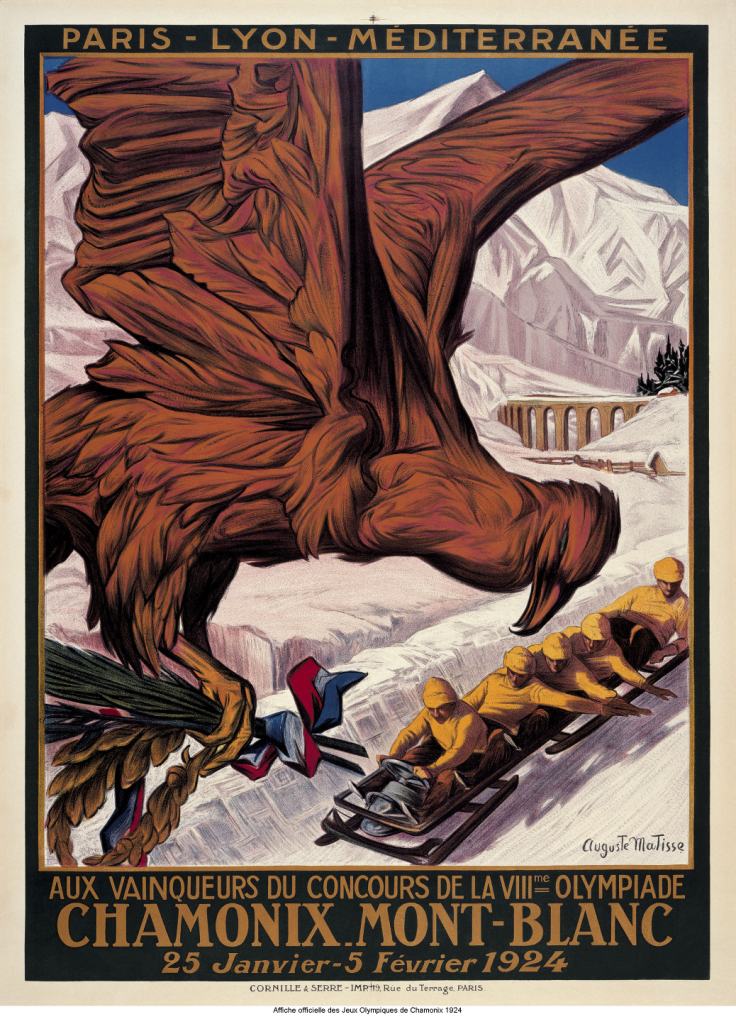
In 1921, at the convention of the IOC in Lausanne, there was a call for equality for winter sports. Though certain winter events (ice hockey, figure skating) already made their Olympic debuts, the winter season was always a hassle for the Games. After much debate, it was decided to organize an “international week of winter sport” in 1924 in Chamonix.
The first gold medal awarded in the Olympic Winter Games was won by Charles Jewtraw of the United States in the 500m speed skate.
Sonja Henie, at just eleven years old, skates in the ladies’ figure skating competition. Although she finishes last, she becomes popular with fans. Henie went on to take gold at the next three Winter Olympics.
The figure skater Gillis Grafström was the first one to successfully defend his Summer Olympics title at the Winter Olympics.
The Toronto Granites finished their qualifying round with three wins, scoring a total of 85 goals against Switzerland, Czechoslovakia, and Sweden without surrendering even a single goal against. Finding themselves in the same situation as Gillis Grafström, the Canadian ice-hockey team is the last ever to successfully defend its Summer Olympics title at the Winter Olympics. Canada would dominate ice hockey in early Olympic competition, winning six of the first seven gold medals awarded.
At the closing of the games, Pierre de Coubertin presented a prize for ‘alpinisme’ to Charles Granville Bruce, the leader of the expedition that tried to climb Mount Everest in 1922.
For the first time in the history of the modern Olympics, the host country failed to win any gold medals, finishing with three bronze medals.
In 1925, the IOC decided to organize Olympic Winter Games every four years, independent of the Olympic Games proper, and recognized the International Winter Sports Week as the first Olympic Winter games in retrospect. The decision to hold the Summer and Winter Games in the same year would be standard practice for the next 68 years.
| Rank | Nation | Gold | Silver | Bronze | Total |
|---|---|---|---|---|---|
| 1 | Norway | 4 | 7 | 6 | 17 |
| 2 | Finland | 4 | 4 | 3 | 11 |
| 3 | Austria | 2 | 1 | 0 | 3 |
| 4 | Switzerland | 2 | 0 | 1 | 3 |
| 5 | United States | 1 | 2 | 1 | 4 |
| 6 | Great Britain | 1 | 1 | 2 | 4 |
| 7 | Sweden | 1 | 1 | 0 | 2 |
| 8 | Canada | 1 | 0 | 0 | 1 |
| 9 | France | 0 | 0 | 3 | 3 |
| 10 | Belgium | 0 | 0 | 1 | 1 |
| Totals (10 nations) | 16 | 16 | 17 | 49 |
GAMES OF THE VIIIth OLYMPIAD (PARIS '24)
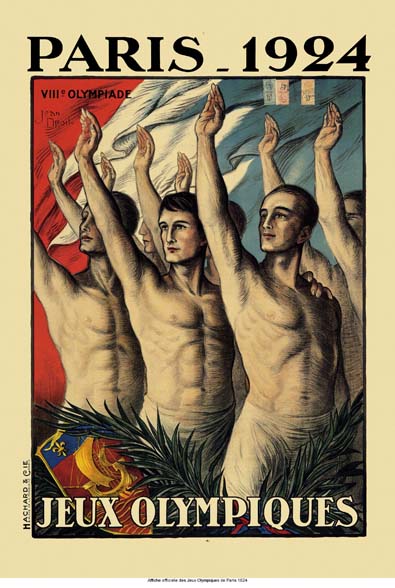
Germany was still not invited for the 1924 Games in Paris. China (although did not compete), Ecuador, Haiti, Ireland, Lithuania, and Uruguay attended the Olympic Games for the first time while the Philippines competed for first time in an Olympic Games as a nation. Latvia and Poland attended the Summer Olympic Games for the first time (having both appeared earlier at the 1924 Winter Olympics in Chamonix).
These were the last Games organised under the presidency of Pierre de Coubertin.
The “Flying Finns” dominated the long distance running, while the British and Americans dominated the shorter events. Paavo Nurmi won the 1,500m and 5,000m and the cross country run. Ville Ritola won the 10,000m and the 3,000m steeplechase, while finishing second to Nurmi on the 5,000m and cross country. Albin Stenroos won the marathon, while the Finnish team was victorious in the 3,000m and cross country team events.
British runners Harold Abrahams and Eric Liddell won the 100m and 400m events, respectively. In addition, Douglas Lowe won the 800m competition.
The marathon distance was fixed at 42.195 km, from the distance run at the 1908 Summer Olympics in London.
The Games were the first to use the standard 50m pool with marked lanes.
Swimmer Johnny Weissmuller won three gold medals in swimming and one bronze in water polo.
Harold Osborn won gold medals and set Olympic records in both the high jump and the decathlon at the 1924 Olympics. His 6’ 6" high jump remained the Olympic record for 12 years, while his decathlon score of 7,710.775 points also set a world record and resulted in worldwide press coverage calling him the “world’s greatest athlete”.
Fencer Roger Ducret of France won five medals, of which three were gold.
In gymnastics, 24 men scored a perfect 10. Twenty-three of them scored it in the now-discontinued event of rope climbing. Albert Seguin scored a 10 here and also a perfect 10 on side vault.
Unexpectedly, the national team of Uruguay won the gold medal in football.
The Olympic motto, Citius, Altius, Fortius (Faster, Higher, Stronger) was used for the first time at the Olympics.
Ireland was given formal recognition as an independent nation in the Olympic Movement in Paris in 1924, and it was at these games that Ireland made its first appearance in an Olympic Games as an independent nation.
These were the first Games to feature an Olympic Village.
The Art competitions were the first time that the Olympic Art competitions were contested seriously, with 193 entries in five categories. A total of 14 medals were awarded, though none were given in the music category.
| Rank | Nation | Gold | Silver | Bronze | Total |
|---|---|---|---|---|---|
| 1 | United States | 45 | 27 | 27 | 99 |
| 2 | Finland | 14 | 13 | 10 | 37 |
| 3 | France | 13 | 15 | 10 | 38 |
| 4 | Great Britain | 9 | 13 | 12 | 34 |
| 5 | Italy | 8 | 3 | 5 | 16 |
| 6 | Switzerland | 7 | 8 | 10 | 25 |
| 7 | Norway | 5 | 2 | 3 | 10 |
| 8 | Sweden | 4 | 13 | 12 | 29 |
| 9 | Netherlands | 4 | 1 | 5 | 10 |
| 10 | Belgium | 3 | 7 | 3 | 13 |
| Totals (10 nations) | 112 | 102 | 97 | 311 |
II OLYMPIC WINTER GAMES (ST. MORITZ '28)
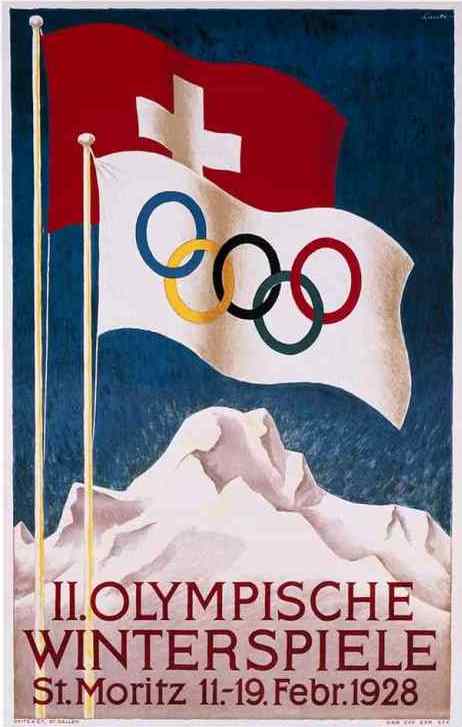
The 1928 Games were the first true Winter Olympics held on its own as they were not in conjunction with a Summer Olympics. All preceding Winter Events of the Olympic Games were the winter sports part of the schedule of the Summer Games, and not held as a separate Winter Games. These games also replaced the Nordic Games.
The opening ceremony was held in a blizzard. In contrast, warm weather conditions plagued the Olympics for the remainder of the Games, requiring cancellations of one event with temperatures as high as 77 °F.
Sonja Henie wins her first gold medal in women’s figure skating.
Ivar Ballangrud won the Olympic title in the 5,000m speed skating and Clas Thunberg won the 500m and the 1,500m.
Norway finished with the most medals, gold and overall.
The single bronze medal won by Switzerland is the lowest output by a host nation at an Olympics.
| Rank | Nation | Gold | Silver | Bronze | Total |
|---|---|---|---|---|---|
| 1 | Norway | 6 | 4 | 5 | 15 |
| 2 | United States | 2 | 2 | 2 | 6 |
| 3 | Sweden | 2 | 2 | 1 | 5 |
| 4 | Finland | 2 | 1 | 1 | 4 |
| 5 | Canada | 1 | 0 | 0 | 1 |
| 5 | France | 1 | 0 | 0 | 1 |
| 7 | Austria | 0 | 3 | 1 | 4 |
| 8 | Belgium | 0 | 0 | 1 | 1 |
| 8 | Czechoslovakia | 0 | 0 | 1 | 1 |
| 8 | Germany | 0 | 0 | 1 | 1 |
| 8 | Great Britain | 0 | 0 | 1 | 1 |
| 8 | Switzerland | 0 | 0 | 1 | 1 |
| Totals (12 nations) | 14 | 12 | 15 | 41 |
GAMES OF THE IXth OLYMPIAD (AMSTERDAM '28)
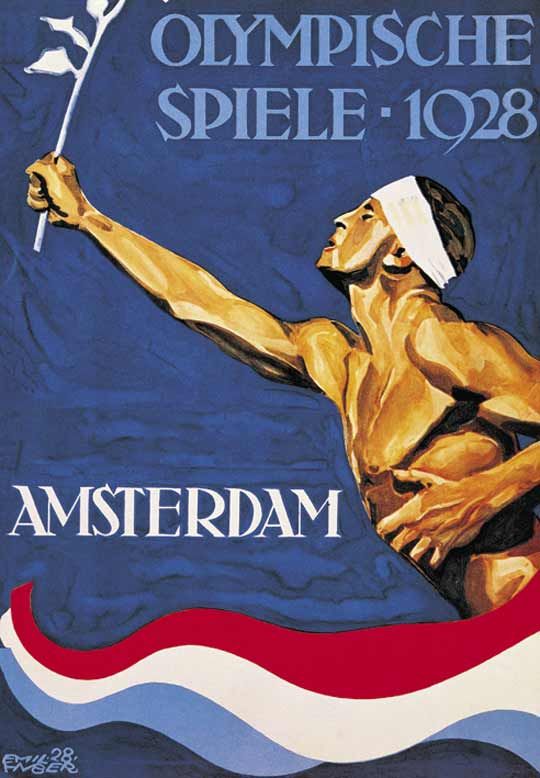
Malta, Panama, and Rhodesia competed at the Olympic Games for the first time.
These were the first Olympics to be organized under the IOC presidency of Henri de Baillet-Latour.
The Olympic Flame was lit for the first time for the duration of the Olympics. The torch relay would not take place for another 8 years.
For the first time, the parade of nations started with Greece, which holds the origins of the Olympics, and ended with the host country.
The Games were officially opened by Prince Hendrik, consort of Queen Wilhelmina, who had authorized her husband to deputise for her. The Queen was unable to attend the opening ceremony as she was on holiday in Norway and did not want to disrupt her trip. This was the second time a head of state had not personally officiated at an Olympic opening ceremony.
Athletics events were held on a 400-meter track, later becoming the standard for athletics tracks.
These Games were the first to feature a fixed schedule of sixteen days. In previous Olympics, competition had been stretched out over several months.
Johnny Weissmuller won two gold medals in swimming: an individual gold in the men’s 100m freestyle, and a team gold in the men’s 4x200m freestyle relay.
Paavo Nurmi of Finland won his ninth, and final, gold medal in the 10,000m race.
Canadian athlete Percy Williams exceeded expectations by winning both the 100m and 200m sprint events.
South American football made a definite breakthrough, as Uruguay retained its title by defeating Argentina.
India took its first ever gold medal in field hockey.
Mikio Oda of Japan won the triple jump event with a result of 15.21 meters, becoming the first gold medalist from an Asian country.
Algerian-born marathon runner Boughera El Ouafi won a gold medal for France in the men’s marathon.
Among the participants was Crown Prince Olav; he won a gold medal in the 6 meter sailing event.
Pat O’Callaghan won the first ever medal for a newly independent Ireland, taking gold in the hammer throw.
The sponsor Coca-Cola made its first appearance at the Olympic Games.
These Games were the first to bear the name “Summer Olympic Games”, to distinguish them from the Winter Olympic Games.
Germany returned to the Olympic Games for the first time since 1912, after being banned from the 1920 and 1924 Games. The German team finished second in the 1928 medal count.
Many cars were expected for the Games, but Amsterdam had no more than 2,000 single car parking spaces. Consequently, a number of new parking sites were provided and a special parking symbol was launched to show foreign visitors where they could park. The white P on a blue background was to become the international traffic sign for parking, which is still used today.
Women’s athletics and team gymnastics debuted at these Olympics. Halina Konopacka of Poland became the first female Olympic track and field champion.
| Rank | Nation | Gold | Silver | Bronze | Total |
|---|---|---|---|---|---|
| 1 | United States | 22 | 18 | 16 | 56 |
| 2 | Germany | 10 | 7 | 14 | 31 |
| 3 | Finland | 8 | 8 | 9 | 25 |
| 4 | Sweden | 7 | 6 | 12 | 25 |
| 5 | Italy | 7 | 5 | 7 | 19 |
| 6 | Switzerland | 7 | 4 | 4 | 15 |
| 7 | France | 6 | 10 | 5 | 21 |
| 8 | Netherlands | 6 | 9 | 4 | 19 |
| 9 | Hungary | 4 | 5 | 0 | 9 |
| 10 | Canada | 4 | 4 | 7 | 15 |
| Totals (10 nations) | 81 | 76 | 78 | 235 |
III OLYMPIC WINTER GAMES (LAKE PLACID '32)
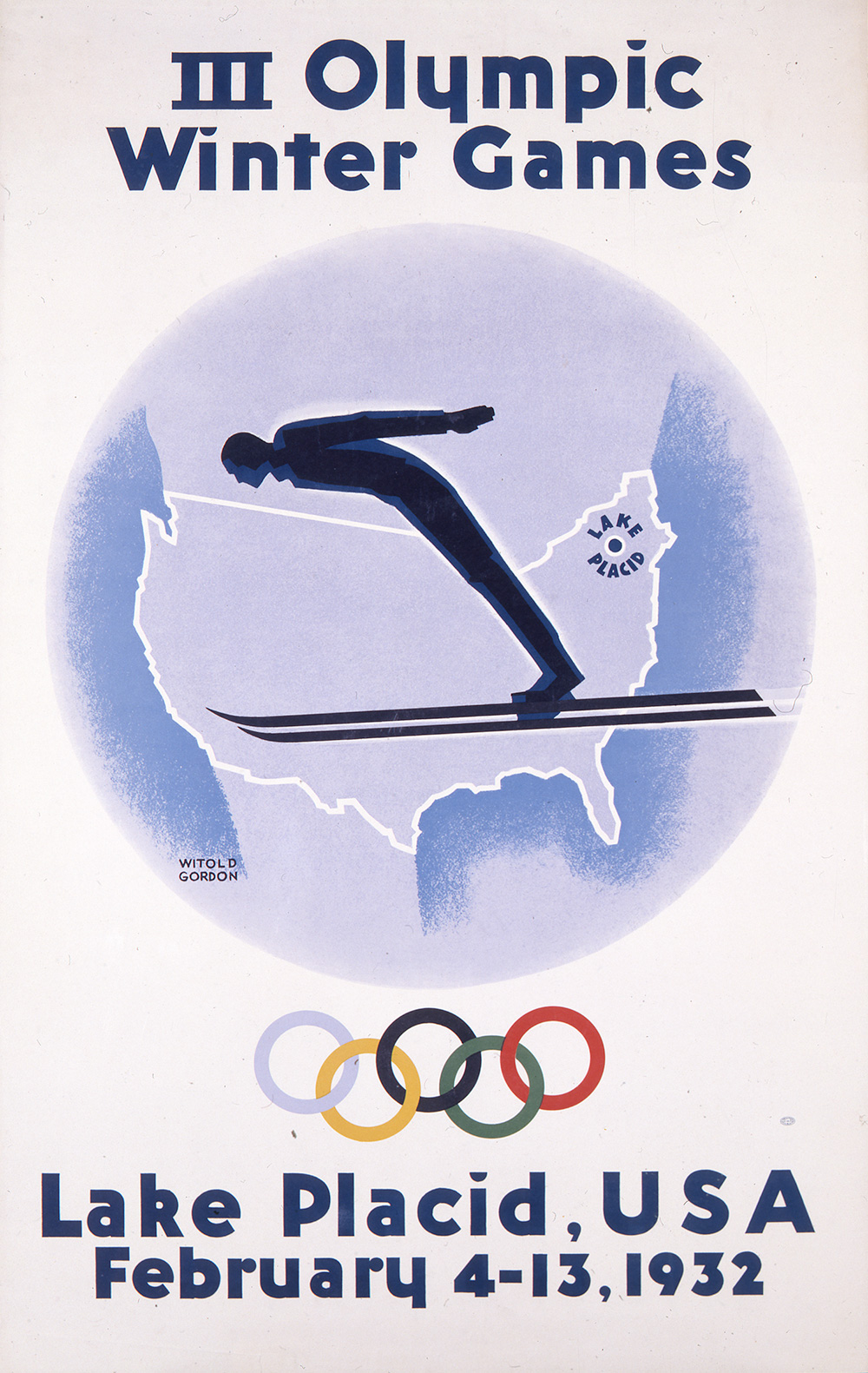
The Games were opened by Franklin D. Roosevelt, the Governor of New York. Later in the year, he was elected President of the United States.
Sonja Henie won the second of three consecutive Olympic gold medals in figure skating. She also won gold in 1928 and 1936.
Irving Jaffee won the 5,000m and the 10,000m speed-skating gold medals, beating previous champion and world record holder Ivar Ballangrud in the 10,000m by 4.5 m.
Eddie Eagan became the only Olympian to win gold medals at both the summer and winter games in different sports. He won gold in boxing in Antwerp 1920 and gold in bobsleigh at Lake Placid. The bobsleigh race was held two days after the games’ closing ceremonies due to unseasonably warm weather in the region the week prior.
The U.S. won the medal tally with a total of 12 medals (6 gold, 4 silver, and 2 bronze). This was the only time the U.S. topped the medal tally at the Winter Olympics.
| Rank | Nation | Gold | Silver | Bronze | Total |
|---|---|---|---|---|---|
| 1 | United States | 6 | 4 | 2 | 12 |
| 2 | Norway | 3 | 4 | 3 | 10 |
| 3 | Sweden | 1 | 2 | 0 | 3 |
| 4 | Canada | 1 | 1 | 5 | 7 |
| 5 | Finland | 1 | 1 | 1 | 3 |
| 6 | Austria | 1 | 1 | 0 | 2 |
| 7 | France | 1 | 0 | 0 | 1 |
| 8 | Switzerland | 0 | 1 | 0 | 1 |
| 9 | Germany | 0 | 0 | 2 | 2 |
| 10 | Hungary | 0 | 0 | 1 | 1 |
| Totals (10 nations) | 14 | 14 | 14 | 42 |
GAMES OF THE Xth OLYMPIAD (LOS ANGELES '32)
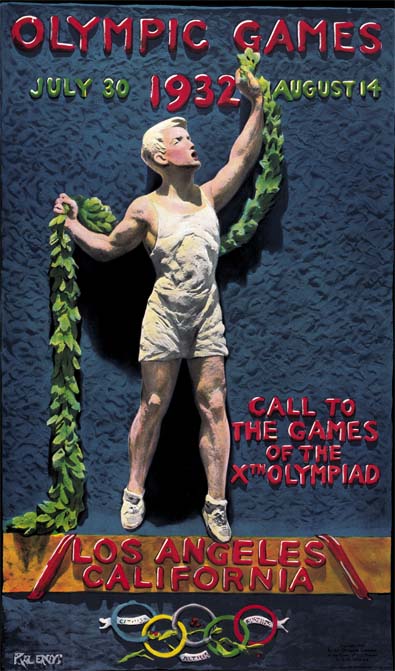
As the Games were held in the middle of the Great Depression, some nations were unable to pay for the trip to Los Angeles; only 37 nations competed. Even President Hoover did not attend the Games.
Colombia made its first appearance at the Olympic Games, and the Republic of China competed for the first time.
An Olympic Village was built for the first time and became a model for future games, in Baldwin Hills, occupied by the males. Female athletes were housed at the Chapman Park Hotel on Wilshire Boulevard.
The victory podium was used for the first time.
Babe Didrikson won two gold medals in the javelin and the hurdles event. She also competed in a jump-off for a silver in the high jump. Her technique in the jump-off was ruled illegal, leaving Didrikson with second place.
Paavo Nurmi was suspended from competition by the IAAF for alleged violation of amateur rules. Finns charged that the Swedish officials had used devious tricks in their campaign against Nurmi’s amateur status, and ceased all athletic relations with Sweden. A year earlier, controversies on the track and in the press had led Finland to withdraw from the Finland-Sweden athletics international. After Nurmi’s suspension, Finland did not agree to return to the event until 1939.
In field hockey, only three nations took part. The host nation lost both matches, 1–24 to India and 2–9 to Japan, but still won a bronze medal.
Poland’s Stanisława Walasiewicz won the gold medal in the women’s 100m; she would also win the silver medal in the event four years later. After her death in 1980, it was discovered that she was intersex and would have been ineligible to participate.
Eddie Tolan won both the 100m and 200m sprint events.
Romeo Neri won three gold medals in gymnastics.
Helene Madison won three gold medals in swimming, while the Japanese upset the men’s events and took all but one title.
Takeichi Nishi was the gold medalist with his horse Uranus in the equestrian show jumping individual event. Nishi’s gold medal is Japan’s only gold medal in the equestrian event to this day.
Kusuo Kitamura won the gold medal in the men’s 1500 meter freestyle swimming race. He was and continues to be the youngest ever male swimmer to win a gold medal at the Olympic Games.
Dunc Gray won Australia’s first cycling gold medal; he set a world record of 1m 13s in the 1000 time trial.
Due to an official’s error, the 3,000 m steeplechase went for 3,460 m, or one extra lap.
| Rank | Nation | Gold | Silver | Bronze | Total |
|---|---|---|---|---|---|
| 1 | United States | 41 | 32 | 30 | 103 |
| 2 | Italy | 12 | 12 | 12 | 36 |
| 3 | France | 10 | 5 | 4 | 19 |
| 4 | Sweden | 9 | 5 | 9 | 23 |
| 5 | Japan | 7 | 7 | 4 | 18 |
| 6 | Hungary | 6 | 4 | 5 | 15 |
| 7 | Finland | 5 | 8 | 12 | 25 |
| 8 | Great Britain | 4 | 7 | 5 | 16 |
| 9 | Germany | 3 | 12 | 5 | 20 |
| 10 | Australia | 3 | 1 | 1 | 5 |
| Totals (10 nations) | 100 | 93 | 87 | 280 |
IV OLYMPIC WINTER GAMES (GARMISCH-PARTENKIRCHEN '36)
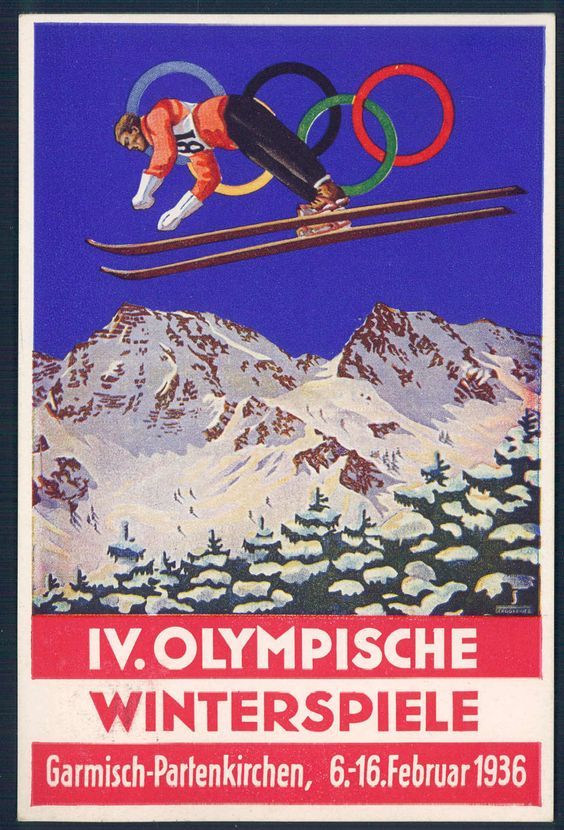
The Games were organized on behalf of the German League of the Reich for Physical Exercise by Karl Ritter von Halt.
Australia, Bulgaria, Greece, Liechtenstein, Spain, and Turkey all made their Winter Olympic debut, and Estonia, Latvia, Luxembourg, the Netherlands, and Yugoslavia all returned to the Games after having missed the Lake Placid Games.
German skier Willy Bogner took the Olympic Oath during the opening ceremonies.
Alpine skiing made its first appearance in the Winter Olympics as the combined, which added a skier’s results in both the downhill and slalom. German athletes Franz Pfnür won men’s alpine and Christl Cranz won women’s alpine events.
Ivar Ballangrud won three out of the four speed skating races.
Sonja Henie won her third consecutive gold medal in women’s figure skating.
Switzerland won the 4 man bobsled in a time of 5:19.85.
Great Britain upset 1932 gold medalists Canada in ice hockey when Edgar Brenchley scored the winning goal within the last ninety seconds.
The country who won the overall games was Norway with a total of 7 gold medals, 5 silver medals and 3 bronze medals.
| Rank | Nation | Gold | Silver | Bronze | Total |
|---|---|---|---|---|---|
| 1 | Norway | 7 | 5 | 3 | 15 |
| 2 | Germany | 3 | 3 | 0 | 6 |
| 3 | Sweden | 2 | 2 | 3 | 7 |
| 4 | Finland | 1 | 2 | 3 | 6 |
| 5 | Switzerland | 1 | 2 | 0 | 3 |
| 6 | Austria | 1 | 1 | 2 | 4 |
| 7 | Great Britain | 1 | 1 | 1 | 3 |
| 8 | United States | 1 | 0 | 3 | 4 |
| 9 | Canada | 0 | 1 | 0 | 1 |
| 10 | France | 0 | 0 | 1 | 1 |
| 10 | Hungary | 0 | 0 | 1 | 1 |
| Totals (11 nations) | 17 | 17 | 17 | 51 |
GAMES OF THE XIth OLYMPIAD (BERLIN '36)
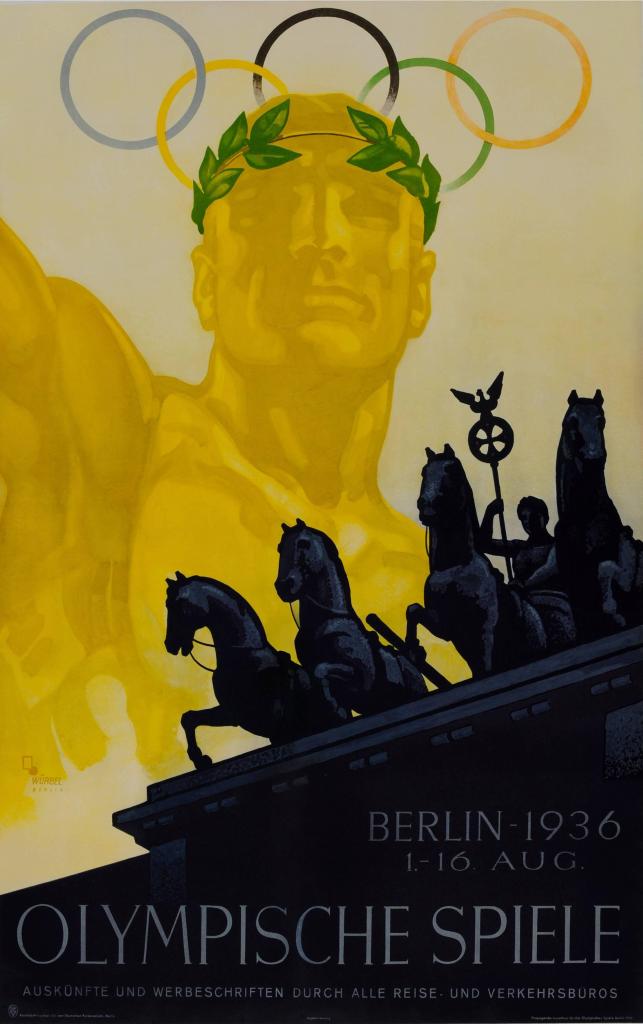
Assuming it’s pretty obvious to anyone what the Berlin Games in 1936 were, I won’t be writing the highlights of it. But, for some who are still not aware or are just curious, here’s the Wikipedia article about the Games.
Basketball and handball made their debut at the Olympics, both as outdoor sports.
Five nations made their first official Olympic appearance at these Games: Afghanistan, Bermuda, Bolivia, Costa Rica and Liechtenstein.
| Rank | Nation | Gold | Silver | Bronze | Total |
|---|---|---|---|---|---|
| 1 | Germany | 33 | 26 | 30 | 89 |
| 2 | United States | 24 | 20 | 12 | 56 |
| 3 | Hungary | 10 | 1 | 5 | 16 |
| 4 | Italy | 8 | 9 | 5 | 22 |
| 5 | Finland | 7 | 6 | 6 | 19 |
| 5 | France | 7 | 6 | 6 | 19 |
| 7 | Sweden | 6 | 5 | 9 | 20 |
| 8 | Japan | 6 | 4 | 8 | 18 |
| 9 | Netherlands | 6 | 4 | 7 | 17 |
| 10 | Great Britain | 4 | 7 | 3 | 14 |
| Totals (10 nations) | 111 | 88 | 91 | 290 |
Holy Moly, thats a lot of detail.
This information could easily form an episode or two of BTW.
WOW!